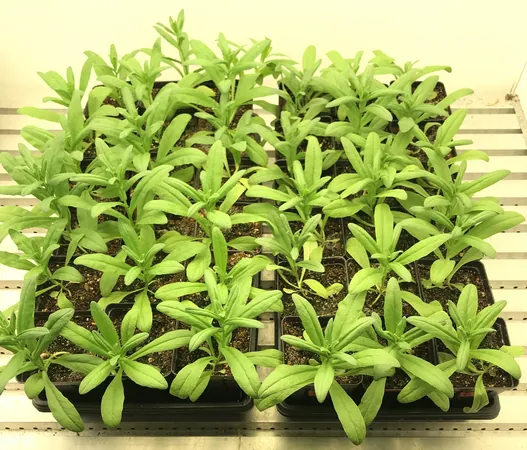
Groundbreaking Advances in Synthetic Biology Could Revolutionize Biodiesel Production from Common Cover Crops!
2024-12-09
Author: Amelia
Groundbreaking Advances in Synthetic Biology Could Revolutionize Biodiesel Production from Common Cover Crops!
In a significant breakthrough, biochemists at Kansas State University have unlocked the potential of two lesser-known oilseed cover crops, pennycress and camelina, to become key players in biodiesel production. Previously dominated by canola, soybeans, and sunflowers, the oilseed market may soon expand thanks to this innovative research.
Led by Professor Timothy Durrett and doctoral candidate Linah Alkotami, the team's pioneering work in synthetic biology dramatically increased the levels of acetyl-triacylglycerols (acetyl-TAGs)—a unique type of oil derived from the burning bush plant—in both pennycress and camelina. These advances have pushed the purity of acetyl-TAGs to nearly 100%, presenting a game-changing opportunity for the biodiesel industry.
What makes acetyl-TAGs particularly exciting is their low viscosity and superior performance in cold temperatures—ideal attributes for high-quality diesel alternatives. "Typically, biodiesel is produced by converting regular vegetable oil through a chemical process," explained Durrett. "However, with these acetyl TAGs, we envision a future where the oil can be directly utilized as fuel without further processing. This could empower farmers to generate their own fuel, enhancing energy independence and profitability."
Historically, oilseed engineering has posed significant challenges, as biochemists have struggled to harness beneficial lipids from various plants and adapt the necessary enzymes for use in other crops. However, Durrett's team has overcome this hurdle by successfully increasing the substrates needed for acetyl-TAG synthesis in camelina and pennycress, achieving remarkable purity levels of 93% and 98%, respectively—far surpassing the typical 50% purity seen in prior studies.
"We've actually surpassed the purity levels of the burning bush plant, which is quite an achievement," noted Durrett, underscoring the magnitude of their discovery.
Looking forward, the research team plans to delve deeper into the modified camelina and pennycress plants to uncover what other alterations might be occurring. "We've found that plants tend to 'fight back' against these changes, and we are still working to fully understand these responses and how we can manage them effectively," Durrett stated. "Even with 98% purity, there's a wealth of questions that still need answers."
Farmers are particularly excited about these developments. Pennycress is notably adept at overwintering, allowing for late fall planting and early spring harvesting. While these crops are currently cultivated mainly in northern U.S. regions, Durrett envisions their expansion across the country as agricultural practices evolve, opening up commercial opportunities for producers.
Additionally, in a related collaboration, Durrett is partnering with Umut Yucel, an associate professor of food science, to investigate how the oils from these plants can be used in the food industry, alongside their potential applications as emulsifiers and lubricants.
The implications of this research are vast, potentially reshaping the landscape of sustainable fuel production while also providing economic benefits for farmers. As this groundbreaking work unfolds, it may just redefine our approach to energy independence and the agricultural economy!









 Brasil (PT)
Brasil (PT)
 Canada (EN)
Canada (EN)
 Chile (ES)
Chile (ES)
 España (ES)
España (ES)
 France (FR)
France (FR)
 Hong Kong (EN)
Hong Kong (EN)
 Italia (IT)
Italia (IT)
 日本 (JA)
日本 (JA)
 Magyarország (HU)
Magyarország (HU)
 Norge (NO)
Norge (NO)
 Polska (PL)
Polska (PL)
 Schweiz (DE)
Schweiz (DE)
 Singapore (EN)
Singapore (EN)
 Sverige (SV)
Sverige (SV)
 Suomi (FI)
Suomi (FI)
 Türkiye (TR)
Türkiye (TR)